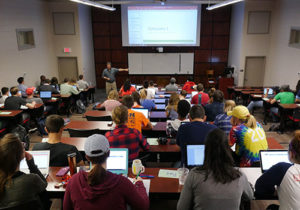(This column originally appeared in LancasterOnline on Jan. 8, 2025.)
We’re optimistic about the promise of 2025 and, for this new year, we’re betting on Pennsylvania. Here’s why: The state is on an upswing and benefiting from a stellar reputation as a magnet for talent.
If that comes as a surprise to you, here are facts and stories from 2024 you might have missed about how independent nonprofit higher education is transforming Pennsylvania and setting us up for success in 2025.
Pennsylvania is the second most popular destination in the United States for out-of-state first-year college students, and 2 in 3 of those students move here to attend one of the state’s 85 independent nonprofit colleges and universities (called the Association of Independent Colleges and Universities of Pennsylvania).
 Why are students choosing Pennsylvania over alternatives such as Florida or California? The Wall Street Journal found that Pennsylvania is home to the third largest number of “best colleges” in the country, according to “how well each college sets graduates up for financial success.” Those factors include salary after graduation and social mobility. Association of Independent Colleges and Universities of Pennsylvania member schools make up the entire top 10 — and 19 of the top 20 — on The Wall Street Journal’s list.
Why are students choosing Pennsylvania over alternatives such as Florida or California? The Wall Street Journal found that Pennsylvania is home to the third largest number of “best colleges” in the country, according to “how well each college sets graduates up for financial success.” Those factors include salary after graduation and social mobility. Association of Independent Colleges and Universities of Pennsylvania member schools make up the entire top 10 — and 19 of the top 20 — on The Wall Street Journal’s list.
Pennsylvania even saw a net increase of 51% in the number of college-educated new residents. All of this translates to a brain gain and a win-win situation for all Pennsylvanians. It adds to our talent pool, boosting industry and innovation.
At the local level, a college can anchor a community by bringing students to local shops, providing good jobs, adding to the tax base and infusing new dollars into the economy.
Pennsylvania’s 85 independent nonprofit colleges and universities collectively generate $24 billion for the state economy, contribute $1.1 billion in state and local taxes and support nearly 200,000 jobs.
Locally, that translates to 11 schools in this region that generate $2 billion in annual economic impact, add $89 million in state and local tax revenue and support more than 16,000 jobs. The regional list includes Dickinson College, Elizabethtown College, Franklin & Marshall College, Gettysburg College, Harrisburg University of Science & Technology, Lancaster Bible College, Lebanon Valley College, Messiah University, Pennsylvania College of Art & Design, Wilson College and York College of Pennsylvania.
Pennsylvania’s residents and taxpayers can agree then that having a college for a neighbor is an asset that benefits everyone. But what about at the individual level? Is a college degree even worth it?
Yes! Here are three ways Pennsylvania’s independent nonprofit colleges and universities are making a degree worthwhile, in terms of affordability, workforce preparedness and social mobility.
Affordability
We’re told that college costs keep going up. While that may be true in other states, the average net cost of a degree at one of Pennsylvania’s independent nonprofit schools has remained flat for a decade, even rivaling the cost of big state and state-related alternatives — which share $1.6 billion in state-supplied funding. The independent nonprofit schools themselves offer the largest share of grants, scholarships and discounts to their students — 10 times the financial aid from the federal and state governments — thus saving Pennsylvania taxpayers $1 billion each year.
Workforce Preparedness
Despite repeated claims by some that college isn’t worth it, a college education will be increasingly necessary in a world driven by artificial intelligence. One study estimates that 72% of jobs in 2031 will require a postsecondary education.
Association of Independent Colleges and Universities of Pennsylvania member schools already lead the commonwealth in educating students for the most career-focused majors, producing far more nurses, teachers and STEM professionals (science, technology, engineering and math) than any other sector.
Social Mobility
In addition to The Wall Street Journal’s 2024 report that found Pennsylvania’s independent nonprofit colleges and universities leading the way in economic outcomes for graduates, the nonpartisan Third Way Economic Mobility Index found that these schools comprise 20 of the top 25 colleges and universities in the state for economic mobility, enrolling 47% of Pennsylvania’s low-income students.
More low-income students in Pennsylvania are earning their degree at an independent nonprofit school than any public alternative, and they’re doing that with better chances of graduating on time, with overall less debt and lower rates of default.
Your local independent nonprofit college “neighbor” is helping the community thrive in many ways this new year. Colleges serve as an anchor and engine to their community, and their education and training helps Pennsylvania be competitive in a changing world.
Thomas P. Foley, a former college president, is president of the nonprofit Association of Independent Colleges and Universities of Pennsylvania.